CubaDebate 174
Gerardo dreamed of being a father

Gerardo, the hero, dreamed of being a father
And he has fulfilled it, three times
By L Eduardo Domínguez, Claudia Yilén Paz Joa
June 17, 2017
When Sunday is celebrated in several regions of the world as Father’s Day, Gerardo Hernandez and Adriana Perez, will have two new reasons to celebrate the special date. The family they built together, fighting two life sentences and 15 years, has already grown to five members, like the five who were the heroes of their cause. The three children born in less than three years, although it is hard to believe, were dreamed of almost exactly as they arrived.
What is a day in the life of the hero who named in letters the children who were going to be born? How did he feed his hope and that of his beloved, more than ninety miles from an infernal hollow? What does a man feel when he fulfills all his dreams and a review of his life is full of impressive coincidences?
Behind the studio glass headsets and microphones are adjusted. They are ready now. Excited and happy, they share laughter and tears, after the poem that provokes memories, music and anecdotes of love. Don’t stop listening to the exclusive interview with the Hero of the Republic of Cuba that from his space “The Light of Memory”, Radio Rebelde gives to parents on their day this Sunday at 11:00 p.m. At Cubadebate we bring you the exclusive.
A CubaNews translation by Walter Lippmann.
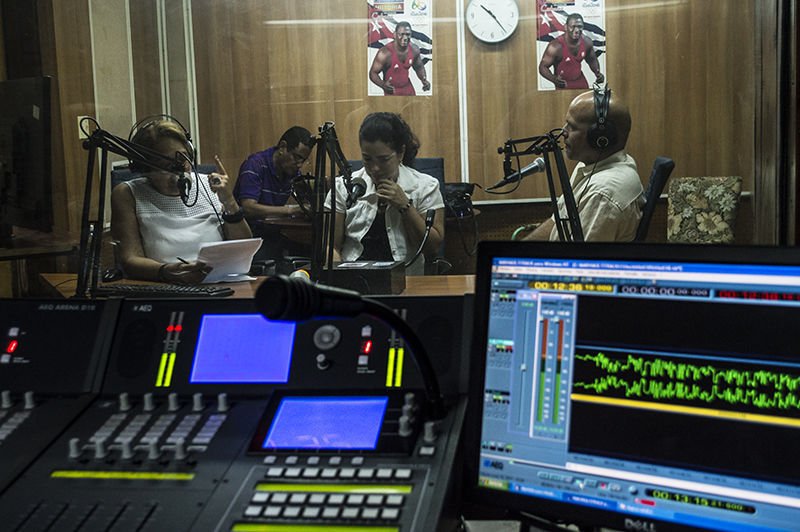
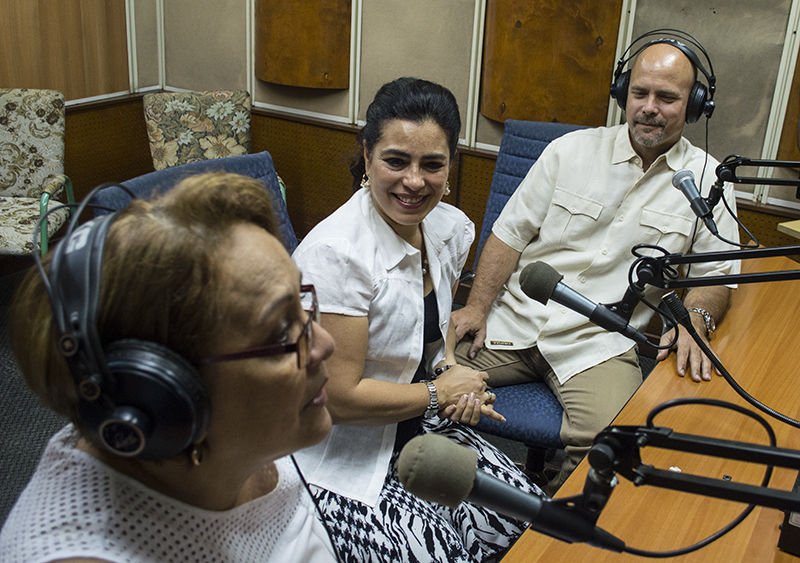
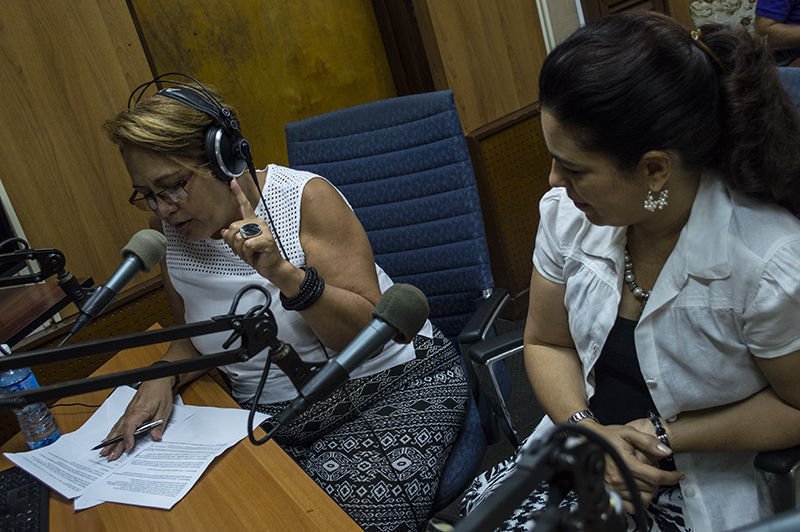
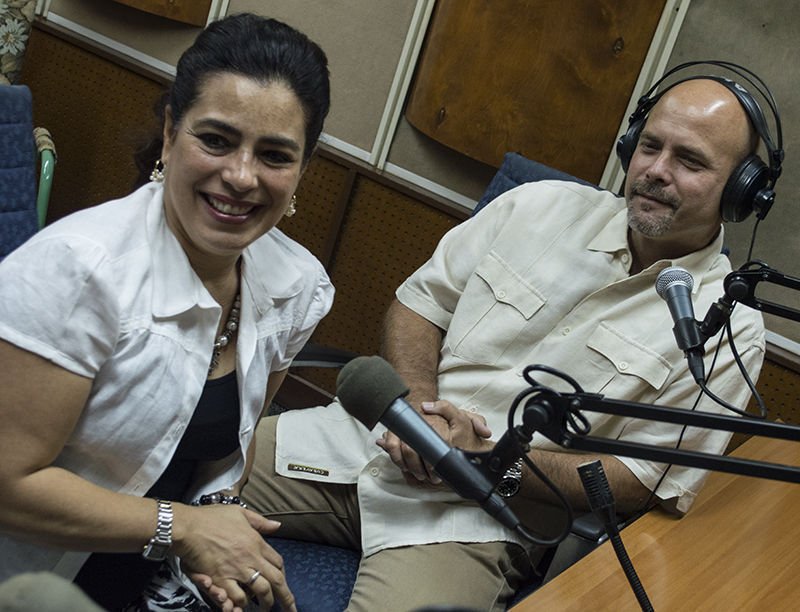
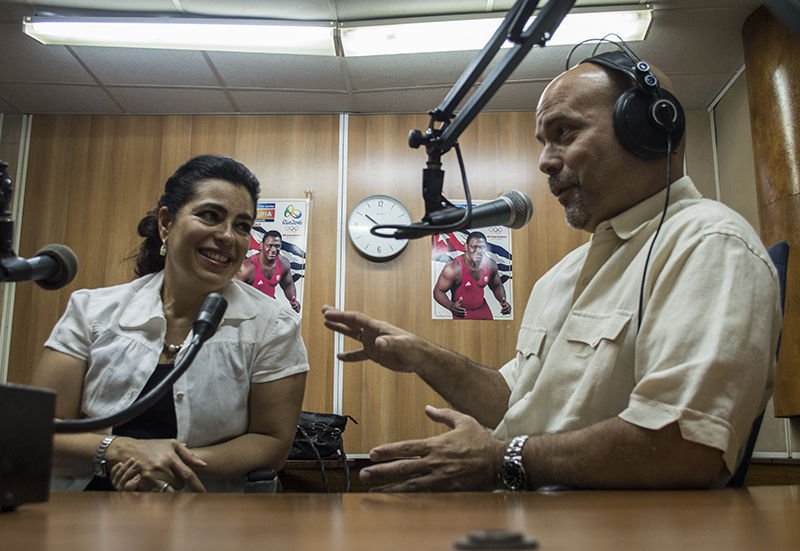
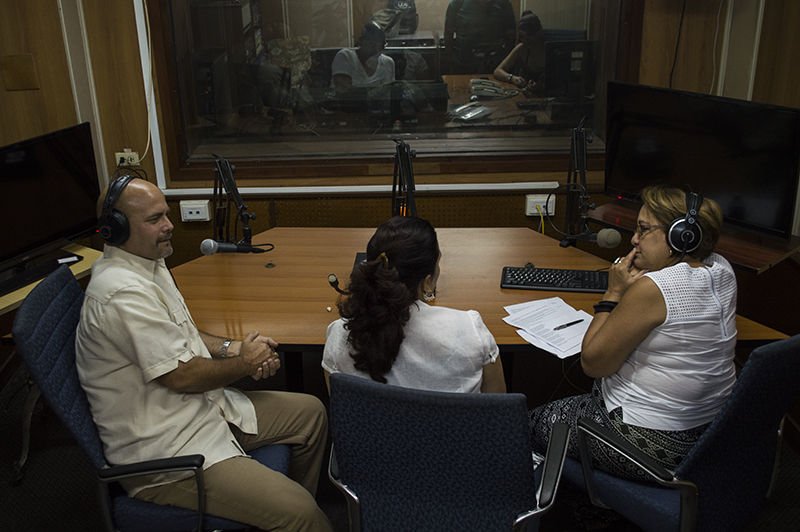
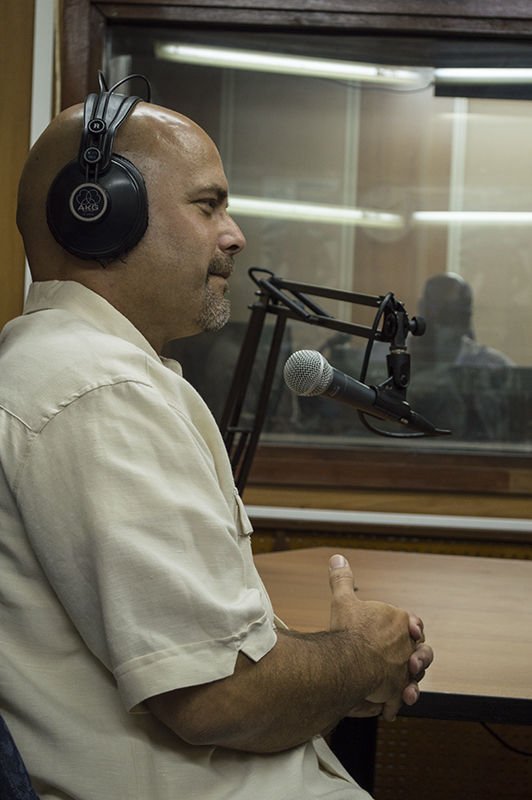
The Handmaid’s Tale

“The Handmaid’s Tale”: The controversy, fiction and a constant provocation
by Yunier Javier Sifonte Díaz
June 17, 2017
Translated and edited by Walter Lippmann for CubaNews.
 The Handmaid’s Tale is perhaps one of the most disturbing TV series of recent times. Provocative in extreme, incisive in its questionings and with a crudity without limits, this production investigates in sensitive areas of the human species and speaks without fear about oppression and the loss of freedom. Fear, corporal punishment and rape, which has become a ritual, coexist with an extraordinary screenplay and attract the applause of the specialized critics, but also the attention of those who wonder where reality ends and fiction begins.
The Handmaid’s Tale is perhaps one of the most disturbing TV series of recent times. Provocative in extreme, incisive in its questionings and with a crudity without limits, this production investigates in sensitive areas of the human species and speaks without fear about oppression and the loss of freedom. Fear, corporal punishment and rape, which has become a ritual, coexist with an extraordinary screenplay and attract the applause of the specialized critics, but also the attention of those who wonder where reality ends and fiction begins.
Based on the novel of the Canadian writer Margaret Atwood’s novel of the same name, the series looks to the near future where environmental pollution has left most women in the United States sterile. Faced with the situation, a radical group seizes power, assassinates the President, annuls the Constitution and implements the Republic of Gilead. In the new society, profoundly fundamentalist and puritanical, most modern values disappear, women lose all their rights and those who can still breed offspring only matter as an object destined to give children to the wealthiest families.
From here, females can only aspire to few roles: a few are the infertile wives of the nation’s leaders, but the rest fulfill functions as maids destined for the repopulation of the country, domestic employees or prisoners sentenced to die while cleaning the areas damaged by the radiation. However, none has the right to read, think or express her views, because, even with the ancestry of ladies or sexual slaves make up that lower group causing the misfortunes of the nation. Among them lives the servant Offred, whose name hardly represents another sign of submission. If she belongs to Commander Fred then she should be named like him.

Corporal threats are recurrent when maids forget their basic rules of behaviour. Photo: Hulu.
This is one of the great successes of the series: the narrative from all possible spaces, with a deep symbolism and a precise structuring of dialogues. From the immutable red dress of the maidservants – joyful to fecundity, but also to blood and pain – through their pre-established attitudes, gestures and conversations, to the cap to restrict their vision of a world they no longer know, everything works to annul their individuality and turn them into standardized subjects.
With different levels of reading and interpretation, for some, The Handmaid’s Tale means a defense of feminism, while for others it represents a good way to reflect on systems of government such as that implemented by the Islamic State or against the rise of neo-fascist or extreme right-wing tendencies in some countries of the planet. At the thematic level, the series does not address current issues such as women’s reification, harassment of homosexuals, ablation [female genital mutilation] or ethical discussions about abortion.
Supported by a millimeter of perfection and an extraordinary passion for detail, director Reed Morano uses whatever element she believes necessary to retrace the path of this deeply misogynistic and inhuman society, to show the harshness of the moment and the anguish of some female characters almost always on the brink of the abyss. Both the careful photography of bluish or ochre tones, as well as the commitment to intimacy in scenes, the punctual use of the soundtrack and the optimal use of some very first shots of Offred’s face -performed masterfully by Elisabeth Moss-, contribute to closing spaces and placing the spectator right in the centre of this asphyxiating drama.
To this end, this maid has two voices, one submissive and fearful and the other known only to the spectator: rebellious, sarcastic, always pungent in the face of the regime’s exaggerations. Narrated by the protagonist from recurrent flashbacks and internal dialogues, the decomposition of society and its silent conversion in the Republic of Gilead appears on screen. “Now I’m awake and I see the world. I was asleep before. That’s how we let it happen. When they massacred Congress, we didn’t wake up. When they blamed the terrorists and annulled the Constitution, we did not wake up either. They said it would be temporary, but nothing changes at all,” recalls Offred to explain how the country arrived in the current state of affairs.

The sobriety of the scenes and the correct use of light give this production a special touch and nuance. Photo: Hulu.
However, these reflections articulate a discourse more anchored to reality and raise questions that are essential for the debate of these times. Does conquering certain universal values such as freedom, democracy and human dignity mean giving up fighting for them? What subsists beneath xenophobia, intolerance, extreme individualism and attempts to construct apolitical or banal subjects?
“Blessed are the meek,” they constantly remind the maids in the centers in charge of training them for their new function, as if eliminating any kind of active posture and making conformism a virtue were an essential objective to achieve domination. And in fact, it is, because the oppression that exists here is not only physical, but also psychological, intellectual and cultural, the only way to dismember a society as a whole.
With seven of the ten chapters of the first season already released and the guarantee of at least one second, The Handmaid’s Tale transcends its exceptional technical skills and its fine adaptation of a classic Canadian literature, but also because it uninhibitedly discusses universal themes such as ideology, morality, humanism, politics and totalitarian and extremist systems. Even without claiming to be a prophetic or apocalyptic work, it has the merit of evading complacent positions and touching sharp areas of a model who likes to see itself as perfect. Responding to the provocations of this series with intelligence and analysis, confronting it without complexes and willing to its art, but also to the debate and questioning, would be good ways to live this story only as fiction.

In this society there is no room for individual initiatives and any activity implies the fulfillment of a ritual. Photo: Hulu.

All the elements surrounding these maids function as symbols of their submission. The regular red dress, the cap, the obligation to go out in pairs to watch each other, are good examples. Photo: Hulu.
Cubadebate exceeds three million visits

Cubadebate exceeds three million visits per month for first time
A CubaNews translation by Walter Lippmann.
At the end of May 2017, our site Cubadebate exceeded three million visits for the first time in a month the number of 3,223,174, despite the technical difficulties we have faced with our servers in recent days.
Cuba was the country that received the most visits with 2,218,591 and received another million visits from the rest of the world.
Cubadebate reached one million monthly visits in 2012 and two million in 2015. For several years, Cubadebate has been the medium of communication, including international ones, best placed in the well-known Alexa ranking for Cuba. In turn, it is the Cuban best located in the Alexa World Ranking, now in the position 6 thousand 361.
On its Facebook homepage, which has more than 437,000 followers, Cubadebate received in May 783,154 interactions and 1.4 million video views. In Youtube 685,560 views were reached in the month, while on Twitter, the main account of the site has 253,135 followers.
Our team appreciates the visits and interactions of our followers; And aims to continue to grow as a communications product, despite shortages and difficulties, always with the input of all of you.
Follow us on Facebook: @cubadebate
Twitter: @cubadebate
Youtube: Cubadebatecu
A Brief History of Tourism

A Brief History of Tourism

Photo: Courtesy of Mintur/Granma/Archive.
By Graziella Pogolotti
May 3, 2017
A CubaNews translation.
Edited by Walter Lippmann.
The image of the tourist was, at first, that of a traveler who, individually, undertook an adventure in search of new horizons to gain knowledge. Thus, exotic visitors began to show up in Cuba, who very often left testimony of their experience through letters, stories or books that proposed more ambitious insights.
The perspective of others gave us a vision of our singularity in the multiple planes that natural and human landscapes offer. For those persons who come from other lands, the richness of a prodigal natural universe –unaffected by the harsh rigors of winter– is striking.
The chromatic luxury of the environment made an impact at first sight. The true singularity was expressed in the human face of a cordial country, with open doors, where the refinement of customs was accompanied by the abandonment of the rigid formalism prevailing in other lands. The deepest bond was established in the human plane and there was also the first-hand approach to a culture forged under different circumstances. Thus, the characteristics of “being Cuban” were beginning to be defined.
Later on, in the twentieth century, workers’ demands gave the middle classes the right to vacation time. Inexpensive because of geographical proximity, access to a tourist trip was within reach of Americans encouraged by the stimulus of the warm climate and the exoticism of a certain folklore trivialized by the trinket trade.
In the winter months, the high season prevailed. It offered an enjoyable warm weather and coincided with the Havana carnival. In Parque Central, a maracas player stood at the door of a store that offered cheap musical instruments, along with belts, purses, and other articles made of genuine crocodile leather.
The flourishing business imposed its perverse features. When Prohibition was established in the United States, Havana was a space open to free consumption of alcohol. Bars multiplied and a malicious substrate became linked to the contraband privileged by the vicinity between the coasts of the two countries.
With its well-known ability to forge mentalities, neo-liberal globalization has appropriated large-scale tourism, associated with what is called with apparent innocence –eternal trap of words–: the leisure industry.
Its extreme expression is manifested in the cruises. In these, instead of observing the new, travelers contemplate each other in a coexistence that consumes most of the available time. In a tour of preset destinations, they pass through some paradigmatic sites and lunge into the search for small souvenirs, trophies to give to friends, once back home. The human landscape and the power of culture have disappeared from the picture. They will get to know, if at all, a masquerade willing to show –with roaring stridency– the expected exotic component.
Before becoming the grave of desperate emigrants, the Mediterranean’s natural environment suffered the predatory effects of tourism. There, too, on a short excursion, the testimonies of one of the original sources of so-called Western culture moved to the background
The Caribbean is the counterpart of that mare nostrum. We preserve virginal areas, but our being an island makes us extremely vulnerable. We have beautiful landscapes, but we lack abundant water resources to quench the thirst of a temporary overpopulation and maintain perfect lawns for golf courses.
In the cultural field, the dangers are even greater. While the Mediterranean tradition still evokes the glories of a dilapidated Parthenon and the infinite management of the Egyptian pyramids, –all victims of neo-colonial perspectives– our culture does not enjoy similar recognition.
Exoticism always maintains a component of underestimation, and our inhabitants have psychologically suffered from this conditioning. Expansive in the last half century, the leisure industry was already emerging, when “the Commander arrived and ordered it to stop.” [a refernence to the lyrics of a song, by Carlos Puebla, referering to Fidel putting an end to capitalist evils].
The hotels that multiplied in Havana were fronts for gambling halls, meeting points for high class prostitution, and business centers of an expanding mafia.
At that time, a master plan for the development of Havana was designed which articulated interests of a diverse nature. Speculation based on the price of the land oriented the growth of the city towards the east, where investments were made with a view to the creation of new neighborhoods.
The government would pay the expenses of infrastructure for investments with an absolute guarantee of profitability. New management centers were being directed there.
The historic city would be at the expense of the underworld. Since the space provided for that predatory universe was insufficient, a floating island would be built in front of the Malecon, for the free flow of large-scale gambling dens. The landscape value of the Malecón –complemented by the gentle hills that shape the profile of the city towards its geographical center, the present-day Plaza de la Revolución– did not matter. The capital of the country, the historical and cultural jewel in our crown, would be hopelessly dismembered.
For a country like ours, lacking in great mining wealth, tourism is a source of income of indisputable importance. The challenge is to devise strategies that enhance the possibilities of development in favor of the nation, culturally and humanly, because in the virtues of our people lies the soul of the nation.
The emergent demand for a large-scale project focused on the advantages of the availability of sun and beaches must be accompanied by the analysis of the risks involved, with the purpose of elaborating the indispensable counterparts. It is important to discard the notion of the leisure industry and to take into account that the fashion of beach enjoyment may be temporary.
Our true strength lies in our status as a large island, endowed with a multitude of possible options: many of them based on a cultural and historical tradition.
There is also the possibility of proposing designs aimed at valuing good living, latent in our large and small cities, in the varied landscape environment, and in the survival of little-explored corners made to the measure of the human being. To elaborate these projects, it would be advisable to complement the geographic and geological maps with a cultural map illuminated by a deep inward look.
Cuba in the OAS?

Cuba in the OAS?
By Atilio A. Boron
June 3, 2009
A CubaNews translation.
Edited by Walter Lippmann.
After a 47-year ban, the OAS sealed an agreement by acclamation yesterday to revoke a 1962 measure suspending Cuba from that body. The resolution was taken without conditions, although it lays down a procedure to be set in motion in the (unlikely) event that Havana decides to join the group. However, there are some facts to be taken into account here.
First: The resolution is a telltale sign of the great sociopolitical changes we’ve seen in Latin America and the Caribbean in the last few years, marked by the United States’ decreasing clout in the region. The vote to render the outrageous move under Kennedy null and void, is at once highly revealing of an ongoing shift that the White House has reluctantly accepted and a step to make amends, if belatedly and partially, for an obviously immoral policy which has long brought unbearable shame upon both the OAS and those governments who have voted for –or at least not against– Imperialism’s plans. Unable to defeat the Cuban Revolution by force of arms at the Bay of Pigs, the U.S. chose to put up a ‘cordon sanitaire’ to keep the island’s liberating influence from spreading across the continent. They never succeeded, by the way.
Second: That the U.S.’s hegemony became weaker is by no means an indication that they give up on using other means to get hold of the region’s resources and wealth or control our governments. It would be an inexcusable mistake to believe that Imperialism will lay down its arms and start to get along with our countries on an equal footing just because its political (and intellectual and moral) ability as a leader has gone into decline. Quite the opposite: in similar circumstances in the past its response was to reactivate the Fourth Fleet in order to achieve by force what they used to get from submissive or abetting governments. And Obama has given us no hint that he intends to change that policy.
Third: Neither Cuba nor any other country in Our America have anything to do in the OAS. As we have oftentimes pointed out, this institution became a landmark of a special period in our continent’s evolution: that of the U.S.’s absolute supremacy. But those days are gone, and there’s no going back. As our political consciousness developed, governments that still look up to the White House have no choice but to vote against the U.S. blockade on Cuba and the 1962 suspension in San Pedro Sula. The OAS has been brought to the limelight for its long record as a docile instrument of the Empire, since it condoned invasions, the assassination of political leaders and presidents (like the murder of Orlando Letelier in Washington), coups d’état and campaigns to destabilize democratic governments. The OAS turned a blind eye –and a deaf ear– to the atrocities of U.S.-sponsored ‘state terrorism’ and criminal policies like Plan Condor. When in May 2008 the Bolivian conflict blew up, the Latin American countries took care of things right away without the OAS getting involved at all. There was no need for it, nor will there ever be.
Fourth: What we do need is to make our various projects of Latin American and Caribbean integration stronger and more coherent, for instance, initiatives such as ALBA or UNASUR, basically different but based on our region’s contemporary situation. The OAS, however, is an inevitably and therefore useless, anachronistic, body in that it represents a world we only find in the delirious ravings of those who yearn for the Cold War era, and that’s why it can contribute nothing to deal with our current challenges. Now that the 1962 resolution has been done away with, the OAS should do mankind a very great service by dissolving.
Norma Aleandro Turns 81

Emblematic Argentine Actress
Normal Aleandro Turns 81
May 2, 2017
A CubaNews translation by Walter Lippmann.
 Icon of the Argentine cinema, actress and director Norma Aleandro arrives today at her 81st birthday in a full creative phase.
Icon of the Argentine cinema, actress and director Norma Aleandro arrives today at her 81st birthday in a full creative phase.
Much rain has fallen since she starred in The Official Story in 1985, the first film from this southern nation to win the Oscar for best foreign film and for which she earned the laurel at the Cannes Film Festival for Best Actress.
She became one of the most acclaimed faces inside and outside of Latin America, Aleandro remains very active, at once directing theater or lending her voice to classic national and world tales in a new cycle in Buenos Aires telling a story.
She recently primiered the play Escena de la vida conjugal, about the work of Swedish Ingmar Bergman, in which she directs two other great actors, Ricardo Darín and Erica Rivas, at the Maipo.
Although almost always seen in front of the cameras, the role of director also draws her.
“It’s a different place to the extent that someone else is going to take the stage but I’m in a place where being an actress is good for understanding the actor’s mind and vice versa. We are good for the actors and we also like to be able to direct, although they are two very different things,” she said in recent statements to an Argentine media.
When asked recently in an interview with the Infobae website, what is the best thing that this career has given her. She answered many things, for example she answered that many things, for example, she said, the knowledge that she can give authors telling stories.
“It helps a lot to understand the human being and therefore yourself. You have to put other people in place who have very different customs, who have loves and hatreds very different from yours, which helps you empathize with the other human being next door.
Argentines who have grown up with Aleandro thank her for her memorable movies and leave nice messages for her on social networks like Twitter and Facebook on this new birthday.
Born on May 2, 1936 in Buenos Aires, Aleandro made her debut in 1952. Among her most notable films are: Autumn Sun, Anita, Gaby: a true story, The son of the girllfriend and The Son of the Bride, and the bed inside.
(With information from Prensa Latina)
Jodie Foster shares with CENESEX specialists

Jodie Foster shares with CENESEX specialists
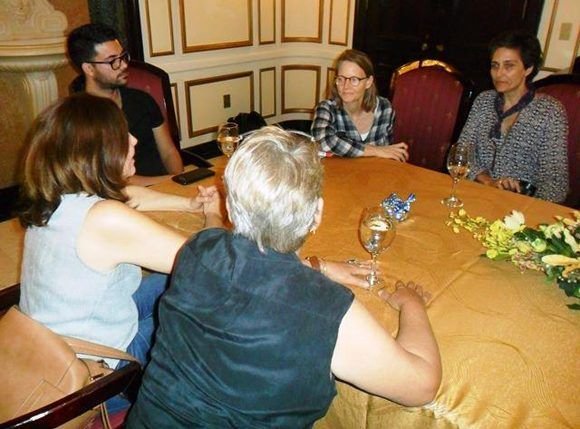
Jodie Foster discusses the work of the National Center for Sex Education (Cenesex) with Dr. Mariela Castro. Photo: Taken from the Facebook of Mariela Castro.
A CubaNews translation by Walter Lippmann.
Recently, actress and American film director Jodie Foster was in Cuba. During her visit to Havana, the winner of two Oscars for Best Actress in 1989 and 1992 shared with specialists from the National Center for Sex Education (CENESEX).
Dr. Mariela Castro Espín shared her impressions about the meeting with Jodie on Facebook today:
“It was a pleasant surprise that the American actress Jodie Foster showed interest in knowing about our work at Cenesex Cuba, during her recent private visit to the Island with her wife, Alexandra Hedison, and her sons Charles and Kit, with whom we had a beautiful family evening” .
Open to scientific search, exchange of experiences and dialogue of knowledge, CENESEX counts on professionals of recognized prestige from different scientific disciplines who use a comprehensive approach in the study of sexuality.
Foster, whose performances in Taxi Driver, The Silence of the Lambs and Panic Room have always been in the memory of her followers, has now been added to the list of artists of the United States who have visited the Island after the approach initiated by Havana and Washington in December 2014.
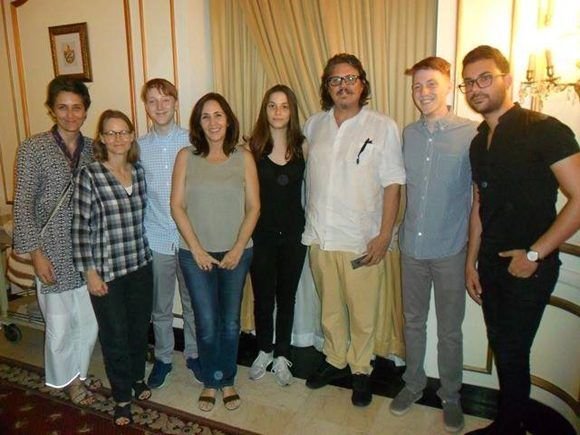
Jodie Foster took a family photo with Cenesex specialists. Photo: Taken from the Facebook page of Mariela Castro
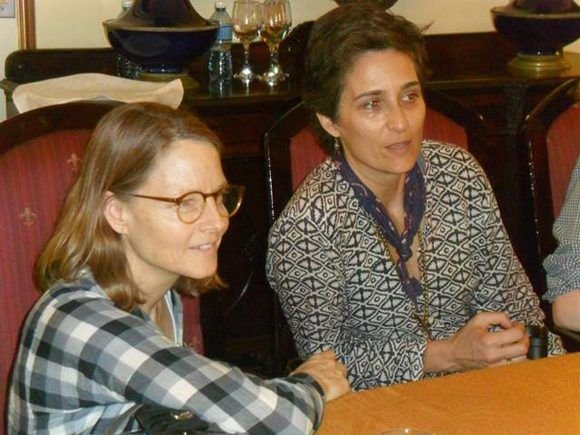
Jodie Foster together with her wife Alexandra Hedison. Taken from the Facebook page of Mariela Castro.
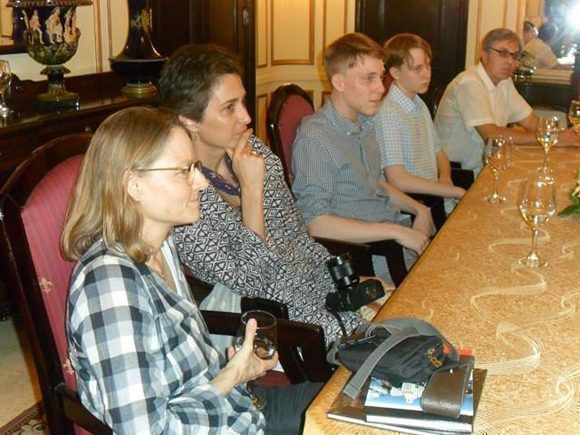
During her visit to Havana, the winner of two Oscars for Best Actress in 1989 and 1992 shared with Cenesex specialists. Photo: Taken from of the Facebook page of Mariela Castro.
“Strange Fruit”, the song that Rebecca Ferguson wants to sing at the Trump ceremony
- English
- Español

“Strange Fruit”, the song that Rebecca Ferguson wants to sing at the Trump ceremony
A CubaNews translation.
Edited by Walter Lippmann.

Singing “Strange Fruit” was Rebecca Ferguson’s condition for performing at the inauguration ceremony of Donald Trump, attended by six religious leaders including a Catholic cardinal, a rabbi, a Hispanic clergyman and a woman.
The artist wrote in her Twitter account that she would only accept the invitation of the president-elect “if you allow me to sing” Strange Fruit “a song that has an enormous historical importance, a song that was blacklist of the United States for being too controversial.
A song that speaks to all the black people despised and trampled in the United States. “
This theme was originally performed by Billie Holiday, but the lyrics are a poem by Abel Meeropol inspired by the historical photograph showing the lynching of two African Americans, Thomas Shipp and Abram Smith, in 1930 in downtown Marion, Indiana.

Thomas Shipp and Abram Smith, in 1930 in downtown Marion, Indiana.
Abel Meeropol was a Jewish professor of Russian origin affiliated to the Communist Party of the United States. He saw this photo of the lynchings that, according to his testimony, followed him all day and did not let him sleep. Then he wrote the poem Bitter Fruit, which he published under the pseudonym Lewis Allan in the New York Teacher and the New Masses. Later he wrote music the poem in the song Strange Fruit. Meeropol is also known for having adopted the children of Ethel and Julius Rosenberg, after they were executed in the United States.
The song became famous in the voice of legendary jazz music Billie Holiday in 1939, and then was sung by Nina Simone. Holiday once said that when he first sang “Strange Fruit” at a New York café, she surprised the audience.
“There was not even a clap when I finished,” he wrote later in his autobiography. “Then a lonely person began to applaud nervously. Suddenly everyone applauded.”
Andrea Bocelli, Elton John, Céline Dion, country singer Garth Brooks are among the artists who have turned down the invitation to participate in the January 20 inauguration event. Even Kanye West, who has publicly supported the president-elect, has said no.
In contrast, Beyoncé sang the American anthem four years ago at the reelection ceremony of Barack Obama, Kelly Clarkson and James Taylor acted after the oath. Alicia Keys, Marc Anthony and Brad Paisley were at the official celebration in Washington.
Rebecca Ferguson ends her response to Trump reminding him that “Strange Fruit” is a song that recalls how love is the only thing that will conquer all hatred in this world, so I will gladly accept your invitation and see you in Washington.
The lyrics of Strange fruit has only three deep and mournful stanzas:
Strange Fruit
Southern trees bear a strange fruit,
Blood on the leaves and blood at the root,
Black bodies swinging in the southern breeze,
Strange fruit hanging from the poplar trees.
Pastoral scene of the gallant south,
The bulging eyes and the twisted mouth,
Scent of magnolias, sweet and fresh,
Then the sudden smell of burning flesh.
Here is fruit for the crows to pluck,
For the rain to gather, for the wind to suck,
For the sun to rot, for the trees to drop,
Here is a strange and bitter crop.
Listen to Nina Simone performing “Strange Fruit” with Spanish subtitles

“Fruta extraña”, la canción que quiere cantar Rebecca Ferguson en la ceremonia de Trump

Rebecca Ferguson. Cantar “Strange Fruit” fue la condición de Rebecca Ferguson para actuar en la ceremonia de investidura de Donald Trump, a la que asistirán seis líderes religiosos incluidos un cardenal católico, un rabino, un clérigo hispano y una mujer. La artista escribió en su cuenta de Twitter que solo aceptaría la invitación del presidente electo “si me permites cantar “Strange Fruit” una canción que tiene una enorme importancia histórica, una canción que estuvo en la lista negra de Estados Unidos por ser demasiado polémica. Una canción que habla a todas las personas negras despreciadas y pisoteadas en Estados Unidos”.
https://twitter.com/julianbovis/status/816212016981491712/photo/1
Este tema fue originalmente interpretado por Billie Holiday, pero la letra es un poema de Abel Meeropol inspirado en la histórica fotografía que muestra el linchamiento de dos afroamericanos,  Thomas Shipp y Abram Smith, en 1930 en el centro de Marion, Indiana.
Thomas Shipp y Abram Smith, en 1930 en el centro de Marion, Indiana.
Abel Meeropol era un profesor judío de origen ruso afiliado al Partido Comunista de los Estados Unidos. Vio esta foto de los linchamientos que según su testimonio le persiguió durante todo el día y no le dejó dormir. Entonces escribió el poema Bitter Fruit, que publicó bajo el seudónimo de Lewis Allan en la revista New York Teacher y en el diario New Masses. Más tarde musicalizó el poema en la canción Strange Fruit. Meeropol es conocido también por haber sido quien adoptó a los hijos de Ethel y Julius Rosenberg, tras se ejecutados en Estados Unidos.
La canción se hizo famosa en la voz de la legendaria música de jazz Billie Holiday en 1939, y luego cantada por Nina Simone. Holiday dijo una vez que cuando cantó por primera vez “Strange Fruit” en un café de Nueva York, sorprendió al público. “No había ni siquiera un aplauso cuando terminé”, escribió más tarde en su autobiografía. “Entonces una persona solitaria comenzó a aplaudir nerviosamente. De repente todos aplaudieron”. Andrea Bocelli, Elton John, Céline Dion, el cantante country Garth Brooks son algunos de los artistas que han rechazado la invitación de participar en el evento de posesión del próximo 20 de enero. Hasta Kaney West, quien ha apoyado públicamente al presidente electo, dijo que no.
En contraste, Beyoncé cantó el himno de Estados Unidos hace cuatro años en la ceremonia de reelección de Barack Obama, Kelly Clarkson y James Taylor actuaron después del juramento. Alicia Keys, Marc Anthony y Brad Paisley estuvieron durante la celebración oficial en Washington.
Rebecca Ferguson finaliza su respuesta a Trump recordando que “Stranger fruit” “es una canción que recuerda cómo el amor es la única cosa que conquistará todo el odio en este mundo, entonces aceptaré de buena gana su invitación y lo veré en Washington”.
La letra de Strange fruit tiene solo tres estrofas, profundas, dolientes:“De los árboles del sur cuelga una fruta extraña. /Sangre en las hojas, y sangre en la raíz. /Cuerpos negros balanceándose en la brisa sureña. / Extraña fruta cuelga de los álamos./Escena pastoral del valiente sur. / Los ojos saltones y la boca retorcida. / Aroma de las magnolias, dulce y fresco. / Y el repentino olor a carne quemada. Aquí está la fruta para que la arranquen los cuervos. / Para que la lluvia la tome, para que el viento la aspire, para que el sol la pudra, para que los árboles lo dejen caer./ Esta es una extraña y amarga cosecha”.
La letra original en inglés es la siguiente:
Strange Fruit
Southern trees bear a strange fruit,
Blood on the leaves and blood at the root,
Black bodies swinging in the southern breeze,
Strange fruit hanging from the poplar trees.
Pastoral scene of the gallant south,
The bulging eyes and the twisted mouth,
Scent of magnolias, sweet and fresh,
Then the sudden smell of burning flesh.
Here is fruit for the crows to pluck,
For the rain to gather,
for the wind to suck,
For the sun to rot,
for the trees to drop,
Here is a strange and bitter crop.
The Body as a Canvas: Images of the World Bodypainting Festival
- English
- Español

The Body as a Canvas:
Images of the World Bodypainting Festival
A CubaNews translation.
Edited by Walter Lippmann.
The World Bodypainting Festival is an annual event created in 1998 by Alex Barendregt, which became one of the most popular festivals of culture and community body painting. The festival attracts top artists and models from more than 40 countries, as well as millions of visitors who enjoy this event on the shores of Lake Wörthersee, in southern Austria.

El cuerpo como lienzo: Imágenes del festival mundial de bodypainting (+ Fotos)
El Festival Mundial de Bodypainting (World Bodypainting Festival) es un evento anual creado en 1998 por Alex Barendregt, quien lo convirtió en uno de los festivales más populares de la cultura y comunidad del body painting. El festival atrae a los mejores artistas y modelos de más de 40 países, al igual que a millones de visitantes quienes disfrutan de tal suceso a orillas del lago Wörthersee, al sur de Austria.
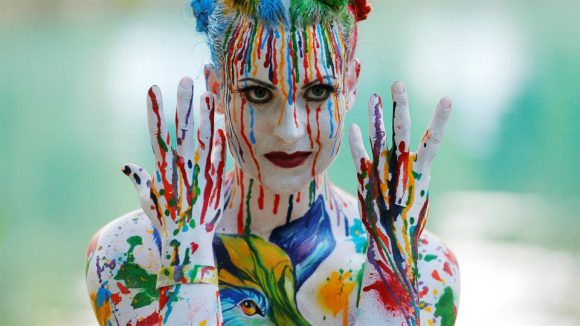
Una modelo posa durante el Festival Mundial de Bodypainting en Pöertschach, Austria. Foto: Reuters
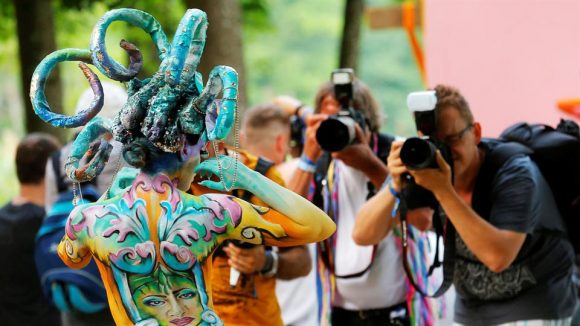
Festival Mundial de Bodypainting en Pöertschach, Austria. Foto: Reuters
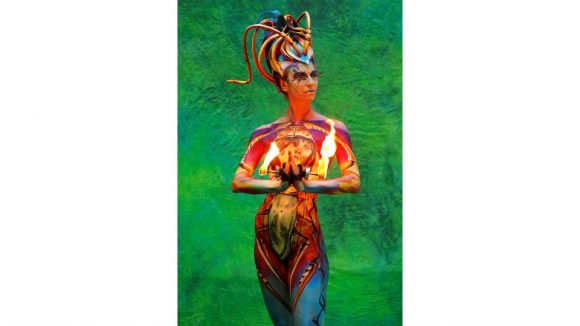
Una modelo posa durante el Festival Mundial de Bodypainting en Pöertschach, Austria. Foto: Reuters
s]
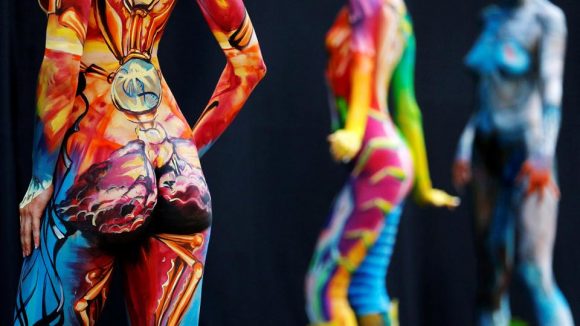
Festival Mundial de Bodypainting en Pöertschach, Austria. Foto: Reuters
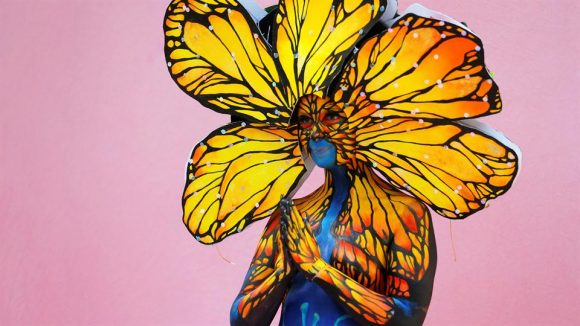
Una modelo posa durante el Festival Mundial de Bodypainting en Pöertschach, Austria. Foto: Reuters
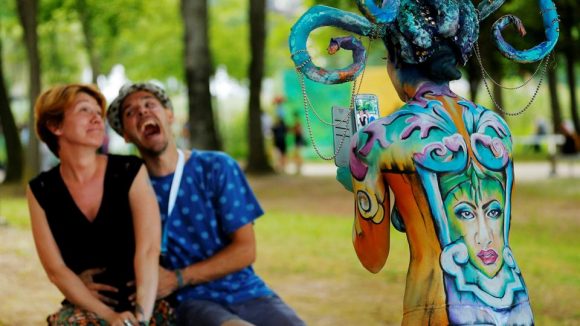
Festival Mundial de Bodypainting en Pöertschach, Austria. Foto: Reuters
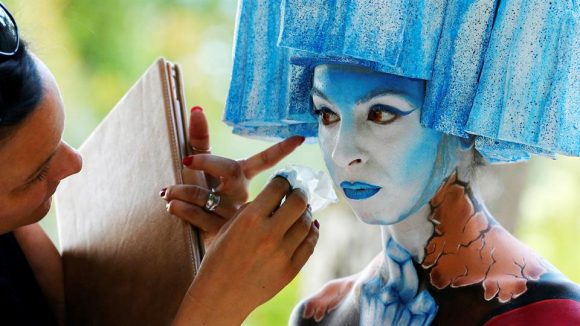
Festival Mundial de Bodypainting en Pöertschach, Austria. Foto: Reuters
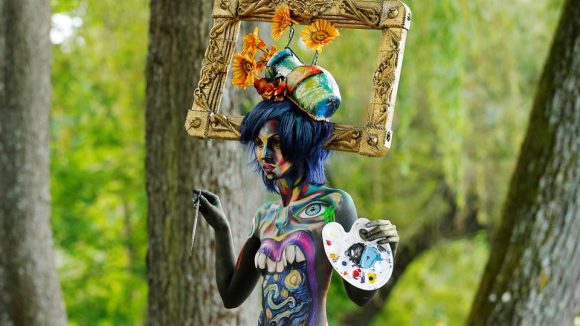
Festival Mundial de Bodypainting en Pöertschach, Austria. Foto: Reuters
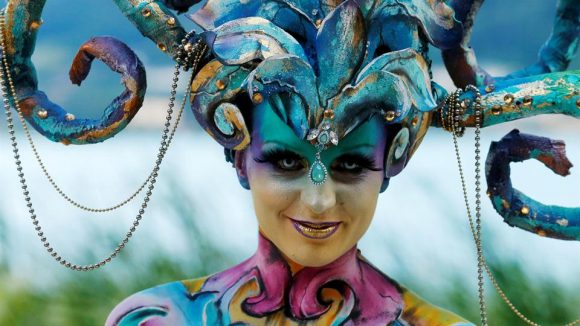
Una modelo posa durante el Festival Mundial de Bodypainting en Pöertschach, Austria. Foto: Reuters

Una modelo con pintura fluorescente que brilla con la luz ultravioleta durante el Festival Mundial de Bodypainting en Pöertschach, Austria. Foto: Reuters
Eduardo Galeano on Muhammad Ali (1967)
- English
- Español

Eduardo Galeano on Muhammad Ali
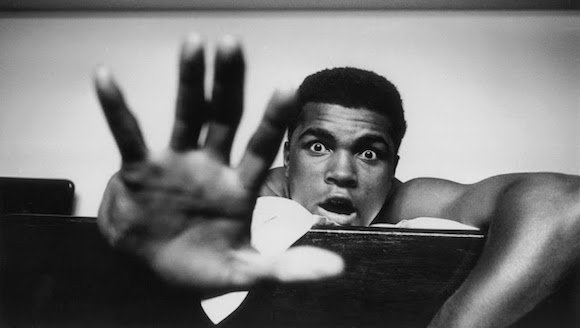
1967: Houston
By Eduardo Galeano
They called him Cassius Clay. He chooses to call himself Muhammad Ali
They made him a Christian. He chooses to make himself a Muslim.
They made him defend himself. No one punches like Ali, so fierce and fast, light tank, bulldozing feather, indestructible possessor of the world crown.
They told him that a good boxer confines his fighting to the ring. He says the real ring is something else, where a triumphant black fights for defeated blacks, for those who eat leftovers in the kitchen.
They advised discretion. From then on he yells.
They tapped his phone. From then on he yells on the phone, too
They put a uniform on him to send him to Vietnam. He pulls it off and yells that he isn’t going, because he has nothing against the Vietnamese, who have don no harm to him or to any other black American
They took away his world title, they stopped him from boxing, they sentenced him to jail and a fine. he yells his thanks for these compliments to his human dignity.
Translation from MEMORY OF FIRE: CENTURY OF THE WIND, by Eduardo Galeano (1988)
 EDUARDO GALEANO is a Uruguayan writer and journalist.
EDUARDO GALEANO is a Uruguayan writer and journalist.
He is the author of THE OPEN VEINS OF LATIN AMERICA.

Eduardo Galeano sobre Muhammad Alí
Lo llamaron Cassius Clay: se llama Muhammad Alí, por nombre elegido.
Lo hicieron cristiano: se hace musulmán, por elegida fe.
Lo obligaron a defenderse: pega como nadie, feroz y veloz, tanque liviano, demoledora pluma, indestructible dueño de la corona mundial.
Le dijeron que un buen boxeador deja la bronca en el ring: él dice que el verdadero ring es el otro, donde un negro triunfante pelea por los negros vencidos, por los que comen sobras en la cocina.
Le aconsejaron discreción: desde entonces grita. Le intervinieron el teléfono: desde entonces grita también por teléfono.
Le pusieron uniforme para enviarlo a la guerra de Vietnam: se saca el uniforme y grita que no va, porque no tiene nada contra los vietnamitas, que nada malo le han hecho a él ni a ningún otro negro norteamericano.
Le quitaron el título mundial, le prohibieron boxear, lo condenaron a cárcel y multa: gritando agradece estos elogios a su dignidad humana.
(En Memoria del Fuego III: El Siglo del Viento)

Subscribe to Blog via Email
| M | T | W | T | F | S | S |
|---|---|---|---|---|---|---|
| 1 | ||||||
| 2 | 3 | 4 | 5 | 6 | 7 | 8 |
| 9 | 10 | 11 | 12 | 13 | 14 | 15 |
| 16 | 17 | 18 | 19 | 20 | 21 | 22 |
| 23 | 24 | 25 | 26 | 27 | 28 | 29 |
| 30 | 31 | |||||


You must be logged in to post a comment.